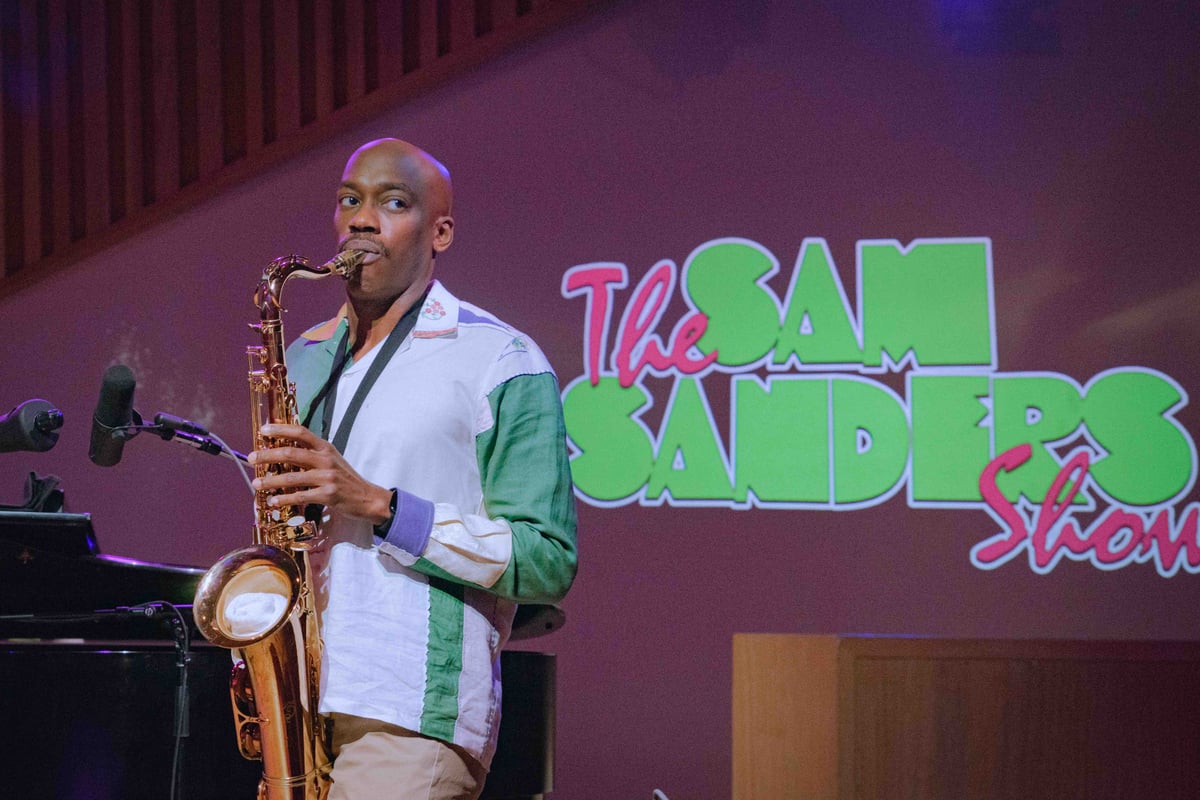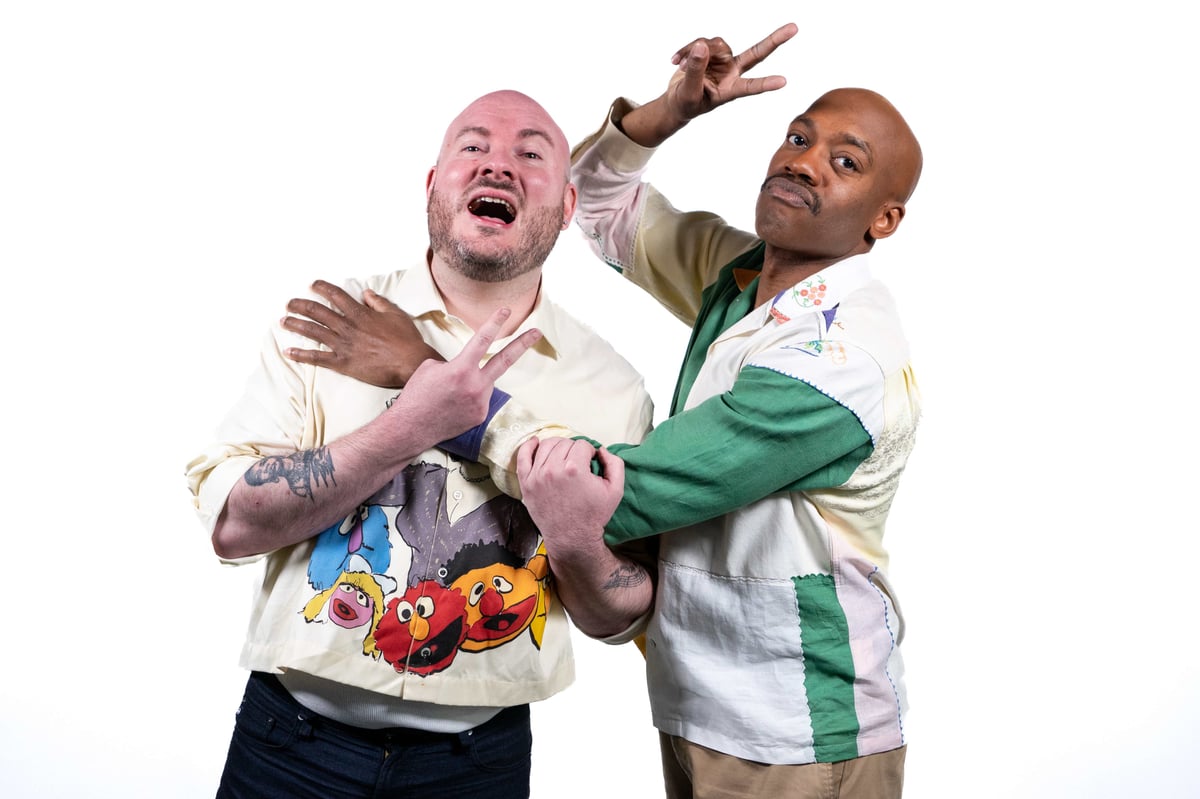
Hey! Sam here. Thanks for checking out the newsletter (and the show!) this week. We’ve got a good one for you. It’s Grammys weekend here in LA, and to mark the occasion, we’re skipping the usual who will win/should win chat and giving you something even better: an in-depth conversation with a vocal coach to the stars. Doug Peck has coached the likes of Billie Eilish and Hayley Williams of Paramore, and directed music for shows like Agatha All Along (yes, he coached Patti Lupone for that one!) and Dear White People. He sat down with me, at a grand piano, to walk me through some vocal training 101 and explain how a lot of his work resembles therapy.
To see me go through vocal warm-ups with Doug, and catch me wearing a replica of Aretha Franklin’s iconic 2008 Inauguration hat (the one with the big bow), check out the show on YouTube. And if you stick around to the very end, you’ll even catch me playing my saxophone with Doug for a spell. In the meantime, I had Doug answer a few questions about his job, just for this newsletter. Enjoy!

What's the biggest misconception people have about vocal coaches and what they do?
Many singers, especially top artists, are reluctant to work with a vocal coach at all, because they think we will fundamentally change their unique sound, that special quality that makes them memorable and moves their audiences. And they're right to fear that, because some vocal coaches do try, in the interest of some generic, dated, racist ideas of what "proper" singing is and isn't! But when a singer comes for her first session, she quickly figures out that I will celebrate and honor her vocal essence, while working my ass off to extend her range, stamina, color choices, and emotional palette.
As for the public, especially with the proliferation of “Vocal Coach Reacts” videos on social media, many people think vocal coaches trade in tips and tricks that instantly change a singer's ability. While we indeed can point out some helpful generalities in a session or two, the real work comes slowly and steadily over time, like working with a personal trainer in the gym.
Why do you ask for new clients’ sun signs when you start working with them?
Considering the stars can give me so much information about a singer and the ways in which they may work best! I'm a Cancer Sun, Leo Moon, Aries Rising with many placements in Libra and Gemini, so I'm all Fire, Air, and Water. If someone is more Earth-centered in their chart —I have none in mine! — we may find that working in a more concrete, measured way could be more effective, especially at first, than someone who is very Watery and wants to dive immediately into the emotional side of singing. Also, if someone looks at me like I'm insane when I ask this question during their intake alongside the more medical-sounding questions, it's a tell that we may not be the best partners in the dimensional artistic process I like best in my studio.
What's the biggest difference between vocal coaching an everyday Joe, versus vocal coaching a celebrity?
The stars I work with tend to be performing their own material, and I'll never get over the privilege of helping them carry their songs from the studio to the stage. It's truly magic to bear witness to an artist singing a song they recorded in pieces all the way through for the first time, as well as to help them keep it fresh over hundreds of performances on a tour. Part of the magic for me comes in helping these singers balance the job aspect with what made them fall in love with music in the first place, constantly rediscovering and reigniting the sparks that inspired their songs.
If you could eradicate ONE bad singing habit from all of us, professional singers, karaoke singers, WHATEVER — what bad singing habit would you eradicate?
I'm a theatre girl with an English degree, so I am constantly wishing for more engagement with the lyrics. Yes, I usually want more diction, but I also challenge all the singers I work with to consider as deeply as possibly the multiple meanings found in a text. Instrumental music is the land of feelings, but music with words is the marriage of sounds and thoughts, and we only have half a meal when we don't spend as much energy on the language as the tunes. And, unless you have a really compelling reason to do otherwise, it's usually best to pronounce the words as you yourself pronounce them. Human ears and hearts can tell when we are being told the truth, and nobody likes a liar.
What's your favorite vocal trend in pop right now?
Like many queer men, I am most drawn to female voices, and we are in a golden age of female singing and writing and producing in pop music. And, after a period of a lot of pop singing living exclusively in soft sounds and muted emotional expressions, we are back to greater dynamic range and rich feelings, and that's the music that has always excited me the most. Let the girls SING!
Least favorite?
I'm a multi-genre musician and listener, and the siloing of musical styles makes me sad for our culture. Just like in so many areas of our lives these days, our tastes can become hyper-specific and isolated from others, unless we take deliberate, conscious action to keep our ears and our minds open. I'm really proud of and grateful for the performers, producers, and programmers who fight this with multi-genre albums and festival bills.
Make it a goal to listen to as many different sounds as you can in your life. If you immediately love a sound, ask yourself what you love about it and why. If you find yourself bored, disturbed, or even angered by a sound, ask yourself why. Music has so much to teach us, and this interrogation process can reveal so much about ourselves and our world.
If you could vocal coach any singer, dead or alive, who would it be and why?
Selfish answer: Leontyne Price, Nina Simone, Aretha Franklin, and Tina Turner, my all-time vocal Mothers, just so I could experience goosebumps from their sounds all day long.
I've often daydreamed about working with Barbra Streisand and Beyoncé, two of the most precise, accomplished vocalists of all time, because their musical languages are so vast and their vocal instruments are so multi-dimensional. I have a sneaking suspicion that even they have a sound or two they never put on a record that we could explore together.
I would also love to have worked with Joni Mitchell in any of her eras, as her voice changed so much over her career as she lived her life and bent her vocal colors in service of her ever-shifting musical language.
Ultimately, all of these Queens would teach me far more than I could ever offer them. But oh, what fun we would have!
Most people will never get the chance to work with a vocal coach. So give them one tip, from an expert like you, that they can easily incorporate into their singing lives right now.
Work on your breathing and don't ignore your head voice. Your whole body is your instrument, and attending to all of it makes your sound as full, present, and unique as possible. Really learn to listen.
Don't ignore your mental health. And go slowly — that's where the real gains are.
Check out the latest episodes of The Sam Sanders Show here.